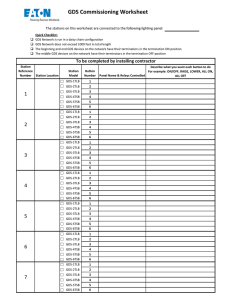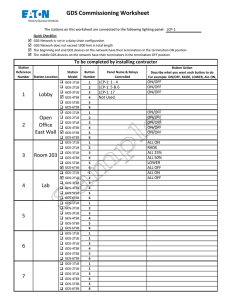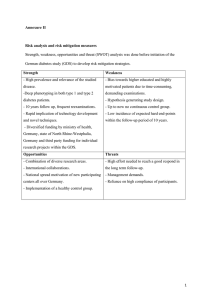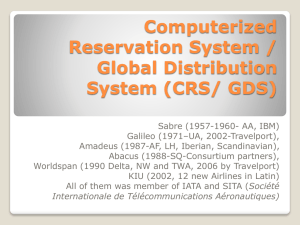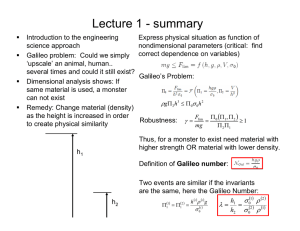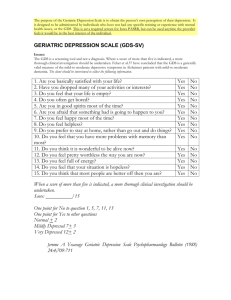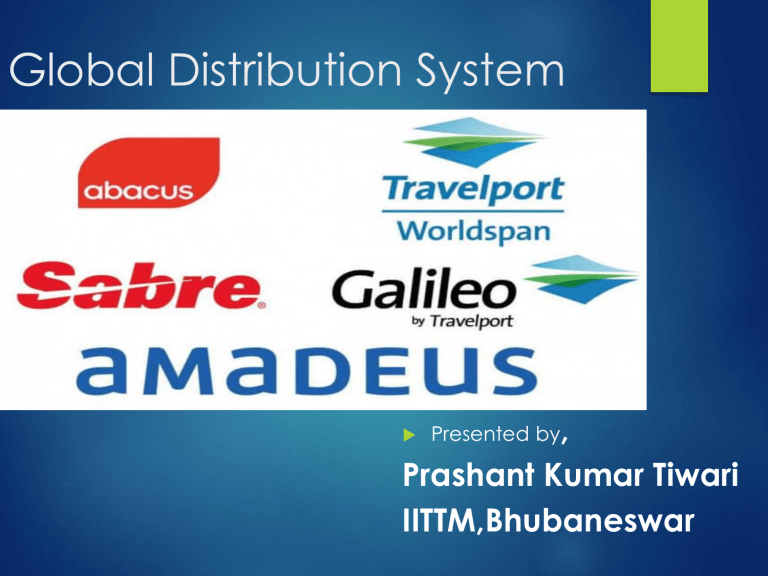
Global Distribution System Presented by, Prashant Kumar Tiwari IITTM,Bhubaneswar Contents Global Distribution System (GDS) Functions of GDS Main Features Of GDS History and Evolution Of GDS & CRS Development Stages Of Various GDS Participation levels of CRS Cases Of o Amadeus o Galileo o Sabre o Worldspan o Abacus What is GDS ? GDS is a database capable of storing and updating enormous information on the supply of a wide range of tourism products worldwide. GDS enable the travel agents to access, in real-time, availability, features and prices of flight tickets, hotel rooms, rental cars, cruises, ferry reservations, trains and other services. The premier global distribution systems are Amadeus, Galileo, Sabre, and Worldspan. They are owned and operated as joint ventures by major airlines, car rental comopanies, and hotel groups. Also called automated reservation system (ARS) or computerized reservation system (CRS). Main features of GDS • Report availability and prices of travel products • Reserve user requests. • Sale and ticketing • Track sales (extend customer’s stay, change of flights, etc). • Facilitates control management for travel agencies). History &Evolution of GDS and CRS The prototype of GDS in the travel industry can be seen in the 1950s as the traditional legacy business model which inter-operated between airline vendors. Computer reservation systems (CRS), at the initial stage, was used by the airline companies as an automated booking system, but later, travel agents were given access. Around 1980, CRS enabled travel agents to connect to various travel providers in a single system. At this stage, in addition to flights, hotels and car rentals were included. CRS acquired much strength by late 80s being so helpful to both suppliers and distributors. In the 90s, computerized reservation systems of airlines were transformed to global distribution systems (GDS). So we see that GDS has developed from airline alliances and ended up becoming independent business units with product internationalization and introduction of new products, especially hotel rooms. Development stages of various GDS Some real benefits of having GDS: Makes the hotelier’s services and presence stronger on a wider range of distribution channels Round-the clock bookings Global connectivity to major distribution systems A cost-effective solution Crs and its Participation in E-Tourism Computerized networks and electronic distribution in tourism emerged in the early 1970s, through internal CRSs. They became central to the distribution mix and strategy of airlines. A CRS is essentially a database which manages the inventory of a tourism enterprise, whilst it distributes it electronically to remote sales offices and external partners. CRSs enable principals to control, promote and sell their products globally, while facilitating their yield management. In addition, they integrate the entire range of business functions, and thus can contribute to principals’ profitability and long term prosperity Contd … CRSs often charge competitive commission rates in comparison with other distribution options, whilst enabling flexible pricing and capacity alterations in order to adjust supply to demand fluctuations. CRSs also reduce communication costs, while providing intelligence information on demand patterns or the position of partners and competitors. Hotel Distribution System The distribution system of rooms is known as hotel distribution system The HDS involves tries to provide direct access to the customers to ensure lower cost. The tourism and travel related information and consumption can be done through distribution systems and as well as directly This distribution channel is constructed as follows: The customer visits a travel agency, travel agency summited the client’s demand to the Tour operator, the Tour Operator applied a request to incoming agencies via a CRS or else, and finally the incoming agency registered a reservation with the hotel. AMADEUS Founded in 1987 by Air France, Iberia, Lufthansa, and SAS, Amadeus is the youngest of the four GDS companies. Amadeus is a computer reservation system (or global distribution system, since it sells tickets for multiple airlines) owned by the Amadeus IT Group with headquarters in Madrid, Spain. Contd.. The company acts both as a worldwide network connecting travel providers and travel agencies through a highly effective processing platform for the distribution of travel products and services (through our Distribution business), and as a provider of a comprehensive portfolio of IT solutions which automate certain mission-critical business processes, such as reservations, inventory management and operations for travel providers (through our IT solutions business). The Amadeus group has three primary corporate headquarters. Their data processing division, product research and development division and the official corporate headquarters are located in three different regions of Europe Products and Services Offered by AMADEUS Travel Providers ➢ Airlines: network airlines, regional airlines, low cost and leisure carriers ➢ Hotels: chains, representation companies, and independent hoteliers ➢ Ground & Maritime: car rental, railway, ferry, cruise and insurance companies ➢ Tour operators: specialty, mass-market and vertically-integrated tour operators Contd …. Travel Sellers ➢ Travel Agencies: including travel management companies, business and leisure travel agencies of all sizes, online travel agencies and consolidators Travel buyers ➢ Corporations: self-booking solutions for companies looking to maximise value from their travel spend. ➢ Travellers : trip planning and checking through amadeus.net and Amadeus checkmytrip.com Performance Amadeus has the greatest number of travel agency locations with the highest productivity per terminal in the world, yet its booking share is Number 3, and its revenues are dwarfed by Sabre and, to a lesser degree, by Galileo. While the company is Number 1 in locations worldwide, serving the greatest number of countries, it provides the fewest U.S. destinations of the top four GDSs. Galileo Galileo began in 1993, when British Airways, KLM (a Dutch airline) and United joined forces to create a computer reservation system It is a major player in the GDS business throughout the world: North America, Europe, the Middle East, Africa, and the Asia/ Pacific region. Galileo is owned by Travel port, an international company headquartered in New York. Travel port specializes in travel-based services and has a gross annual income of more than 2 billion dollars. Products &Services offered by Galileo Galileo provides global distribution system (GDS) services for the travel industry through Galileo Desktop 2.0- Galileo Desktop is a sophisticated global reservation, business management and productivity system. Galileo e-Tracker- A simple to use, web-based tool that enables agents to check all electronic tickets issued via Galileo. Travel port Smart point- The latest version of Travel port’s point and click technology. It evolves the Galileo Desktop with dynamic and interactive technology that improves travel agents productivity and customer service. Contd …. Travel port View Trip-A comprehensive online travel resource providing agencies and their customers with direct access to their own personal travel itinerary, electronic ticket records and electronic expense receipts, including the ability to retrieve, review, print and e-mail data from any internet-enabled location Galileo Integrated Data Source- is a structured data stream which collects core PNR data from the Apollo and Galileo host systems to enable customers to manage pre and post trip reporting to effectively control travel budgets and business operations. Contd…… Travel port e-Pricing- Technology has revolutionized the worldwide travel shopping experience. It is built upon the first multi-server based shopping technology in the global distribution system (GDS) industry. It allows travel agencies, corporate travel buyers and online shoppers to shop, price and book low fares faster and more accurately than ever before. Travel port Rapid RE price -Automates the complex itinerary re-pricing function allowing agents to efficiently re-price a ticket in a matter of seconds. The whole process of locating original ticket data, interpreting and applying fare rules correctly, building new fares and exchanging the tickets is automated Automated Exchanges and Refunds (ARNE) -Fully automates ticket exchanges and refund calculations. Validates change penalties and change fees. Contd. …. E-Learning -Designed for busy professionals with comprehensive information about Ticketing solutions Focal point Shopping, hotel bookings, car rental or any other related services. Equip you with everything you need to know about ticketing solutions, Galileo Custom Check- A proven quality control solution that comes into play at the point of sale, ensuring that your bookings adhere to corporate or agency policies – prior to ending a transaction and ticketing. Custom Check is available to subscribers of the Galileo and Apollo global distribution systems (GDS). Galileo Web Services (GWS) -An application program interface (API) that enables customers to build an interface such as a website, connected to the Galileo GDS. Through GWS, travel companies can easily integrate Galileo travel content with their own systems to create their own website and grow their business. SABRE For more than 40 years, Sabre has been developing innovations and transforming the business of travel. From the original Sabre computer reservations system in the 1960s, to advanced airline yield management systems in the 1980s, to leading travel web sites today, Sabre technology has travelled through time, around the world, and has touched all points of the travel industry. Sabre, represented in 45 countries, is a leading provider of technology for the travel industry and provides innovative products that enable travel commerce and services, and enhance airline/supplier operations. Headquartered in Southlake, Texas, Sabre connects more than 60,000 travel agency locations around the world, providing content from approximately 400 airlines, 55,000 hotel properties, 52 car rental companies, 9 cruise lines, 33 railroads, and 229 tour operators Sabre-connected travel agencies use Sabre web- based technologies and low-fare finding solutions to create new sales opportunities, drive operational efficiencies, and improve customer service. Sabre-Marketing & Planning key capabilities Market analysis and scheduling Pricing and revenue management Revenue accounting Cargo management In Flight services and Catering Sabre- Customer Sales & Service key capabilities Reservation and ticketing Inventory management and Revenue Optimization Departure control and self service tools Shopping and Marchandizing E-Commerce Customer data and Insight Sabre- Enterprise Operations Key capabilities Flight operations Airport operations Operations control center Crew management Maintenance Routings Competitive Strength of Sabre Sabre’s competitive strengths include market position, global reach, stable product line, diversification of revenue streams, and intellectual capital. The Sabre business model is a strong one, and continues to make significant progress in advancing both its electronic travel distribution and its information technology solutions businesse Worldspan Founded February 7, 1990, World span was originally owned by affiliates of Delta Air Lines, Inc., Northwest Airlines, and Trans World Airlines, Inc. It is the technology leader in Web-based travel e-commerce, offering solutions for conducting all facets of travel business in the online channel. It is currently owned by affiliates of Delta Air Lines, Inc. (40%), North west Airlines (34%), and American Airlines, Inc. (26%). Since its 1995 advance into the world of Internet technology for the travel industry, World span has successfully developed the strategies, solutions, and services to ensure the company’s long-term success in the new web-based world of travel distribution. Headquartered in Atlanta, Georgia, World span connects approximately 421 airlines, 210 hotel companies, 40 car rental companies, 39 tour and vacation operators, and 44 special travel service suppliers. Product Solutions and Services Of Worldspan World span Go -World span Go brings a spectrum of travel planning and management solutions to your desktop, combining browserbased travel technologies and the power of the World span GDS. World span Airline Source- Airline Source is the highest level of connectivity for your airline in the World span GDS. World span Fare Source- World span Fare Source is one of the most comprehensive and accurate fares and pricing solutions for airlines worldwide. World span Hotel Distribution Solutions -World span’s industry-leading technologies for hotel distribution, shopping and booking include the GDS- based World span Hotel Select system and integrated Webbased tools. Contd… … World span Interactive Maps for Hotels -World span Interactive Maps for Hotels is the advanced shopping and booking solution that lets users shop, price, compare and book hotels in a visual environment. World span Car Rental Distribution Solutions World span’s leading technologies for car rental distribution, shopping and booking include World span Car Select and integrated Web-based tools. World span XML pro- World span XML Pro is the leading global data exchange tool for building fully functional travel applications and establishing GDS direct connects via the Internet. ABACUS Abacus is Asia’s leading travel solutions and services provider, specializing in the complex and ever-changing Asian travel marketplace Abacus has been in the business of travel solutions since 1988 and is dedicated to insuring the needs of travellers in the Far East market are met with efficiency and accuracy. Abacus is able to provide travel agencies with the software and technologies to go into the online world with ease, affordability and scalability. Abacus Web Start enables travel agencies to provide fare search, reservation and booking capabilities with less effort and cost than many other software services Abacus works closely with many key partners in the industry to provide an expansive portfolio of specialised products and services to support every travel agency segment including online, corporate and leisure Conclusion Though each of these systems enjoys unique business competitiveness, they are all different in terms of each other in the way they manage the stakeholder and operate in the market. Going by the market and the trends in the tourism industry these models have to work out on more effective as they will be facing some serious threats in terms of cost and various other cultural aspects. Only the GDS companies that are willing to continuously learn and change according to the requirement of the market will be able to survive the competition and succeed in the long run. Refrences www.google.co.in www.quora.com www.businessdictionary.com Pondicherry University E-Tourism Study Material
